While doing research on Goethe’s poem, “The Erkönig“, to see to what extant one might find “Gewalt“, i.e. force or violence mentioned, I came across a copright-free German humor publication by the name of Fliegende Blätter, which might be translated as something like Flying Leaves, where the leaves referred to would be the sheets of the publication in question. This publication was written so long ago, that without analysis, it would be impossible to determine whether this was a broad-sheet, or a tabloid, though the humor would better fit into the latter. (The size of the images would be a clue which might be analyzed.)
The specific reference to violence mentioned there, as it was only in the context of a story, made it irrelevant for my article on “The Erkönig”, but a couple of pictorial ideas were found which indeed were germane. The type of violence depicted has mostly been outlawed in the last 30 years or so, which does not mean that it no longer exists. Therefore, for those readers not interested in seeing beatings dished out, or to see how things were like in the past (not just in Germany!), please refrain from satisfying any morbid curiosity. The main focus is a study in historic German humor, (and that, originally, as it related to my previously mentioned writing).
One might ask how this theme actually fits in with the title. Is it click-bait? Perhaps it will work that way, but by way of introduction, I wanted to give the general tenor of Fliegende Blätter, with some humor which would not really fit in with my intended narrative, unless I could come up with some kind of linkage. In that sense, I have taken from those pages ploys used by two different individuals – one is a bride, the other a thief. Their comments, to use a slang expression, beat all. This then serves as a pun on the remaining images, in all of these, there is a beating.
Translations are not always literal. As an example of why not, we show in the first image, that the bride says “Sir Reverend”. Such a use of “sir” is a German form which sounds ridiculous to English ears, and so, we have tried to make things sound a little bit more like normal English instead. (I am not specifiying whether that be American or British!)
Let’s start with the bride, chastising the priest or minister for his opening remarks:
Priest to groom: In the sight of God and all those present, I ask you if you want to take Vivian as your lawful wife and ….
Bride: Permit me, (Sir) Reverend, you have asked my groom if he wants to take me as his wife; but I’m telling you, he should be glad that I’m taking him. He’s got absolutely nothing, and I’m worth 500 Guilder, (let’s say, $500,000 in contempory currency), so you should have asked me first!
In our second image, the prosecutor asks the thief to confess in what way he broke the safe.
The accused: “Excuse me, prosecutor, sir, I cannot reveal that, it is a trade secret.”
(Original German: Staatsanwalt: Angeklagter, gestehen Sie nun, auf welcher Art Sie die Kasse erbrochen haben?” — Angeklagter: Entschuldigen Sie, Herr Staatsanwalt, das kann ich nich verrathen (verraten), das ist ein Geschäftsgeheimniß!”
Our third image could almost be compared to the Erlkönig story, but instead of a sick boy, we have a dead lady, and a suffering animal. The name of the verse would be literally translated as “The Pain Deflector”, but I would suggest, in keeping with my previous interest, “An Absent Erkönig”.
Upon a mule rides a shepherd / Of his legs each heel
Touches the ground. / Though big is this fellow/ Bigger is his ordeal.
On a verdant knoll, calm and happy / It was his flute he blew,
Then came the message, that his love / Death did anon ensue.
Fast he lept on the faithful beast, / homeward urged, straight ahead,
Oh, too late, the place was reached, / By now, the loved one’s very dead.
What should he do? What can he do? / In pain, this poor rogue dull
He takes his staff, a beats therewith / The mule upon its skull.
(The original German is not a great verse either – I feel that both the quality and the tenor of the words are adequately reflected. )
Now there are two images of a pictoral story, showing how a peasant spent his Sunday, the translated title is “Peasant’s Sunday Celebration”. After washing up under a hand-operated pump (not shown), he beats his children, or at least his son:
The boor now early Sunday morn Has his ablutions, but we'd them scorn Of parental duty and of pure delight He beats his sons with all his might. (More literally: "On Sunday, already very early, the farmer washes himself, but how? Then, out of fatherly duty and out of pleasure, he beats his lads thoroughly.)
By the way, does anyone notice any similarity of that body, face, and hair to another tyrant?
There are four images which we have not illustrated: He goes to church, talks shop with his friends, goes home for lunch, and allegedly checks up on the progress of his crop.
Then, the final image, in which we find him, as in a Western saloon, participating in a pub brawl:
In the tavern then, by him adored,
Brawling, he ends the Day of the Lord.
Finally, and this is the kicker, a man wants to show his wife who is the boss in the house:
The title, “Hausrecht”, translates as “Domestic Authority”, although from a legal point of view. It sounds better, though, than “house rule” or “domestic regulations”. Although the image was digitalized by Google, it is almost impossible that someone will look for the literal, low-class German employed in the text: Frau: „Ob D’ jetzt ‘rausgehst!!“ Mann: „Extra nicht, — ich will Dir zeigen, wer Herr im Haus ist!“ Translated in the spirit of the original: Woman: “Yuh comin’ out now?” Man: “No way! I’ll show you who’s the master of the house!”
Quite the liberated woman! Maybe the one from the first picture, after her husband squandered all her money, and brought her to ruin?
Notes:
Page numbers of the source have been edited into the pictures. It seems not to have been necessary to mention that the work was digitalized by Google, as the process applied to the original work has been lost here. The link to the work is:
https://books.google.com/books?id=0HtGAQAAIAAJ.
As a help in getting to the original images, which may have been slightly deformed here, the following search criteria is offered:
Priest to groom; Erlauben Sie, Herr Pfarrer fliegende (Always choose the topmost result specifying books.google.com, and Fliegende Blätter.)
Prosecutor, Accused: welcher Art Sie die Kasse erbrochen fliegende
Mule: “was soll er thun, was kann er thun” fliegende
Fatherly duty: “wascht sich der Bauer, aber wie” fliegende
Tavern scene: Beschließet er den Tag des Herrn fliegende (for this search, the recommended spelling is not correct!)
Domestic Quarrel: ich will dir zeigen, wer Herr im Haus fliegende
The above should work, because of the rarity of the expressions, combined with the source. In case of difficulty, instead of only “fliegende”, put “Fliegende Blätter”, (the quotation marks are not necessary).
For those who cannot read the old German lettering, by copying the text (perhaps it would be necessary to download it first, which is what I did), and then pasting it into an editor. Legible letters will appear. Some of the spelling will be obsolete. The most confusing issue is probably that of “th” for “t”. Other disparities should be possible to solve with a minimum of consideration for what might now be considered as bad spelling.
More versions of Fliegende Blätter can be accessed through the article on this publication in Wikipedia. Apparently, all available issues have been digitalized.
My claim to copyright does not apply to the original German text or images, but to this article, and to the translations of the German text. Anyone is free to make their own translations in a competing article.
January 29, 2020.
© 2020, Paul Karl Moeller.
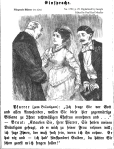
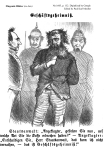
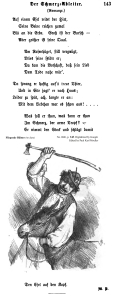

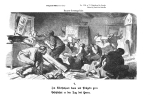
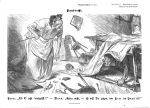
Leave a comment